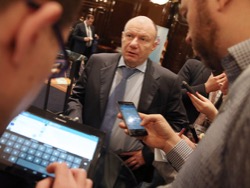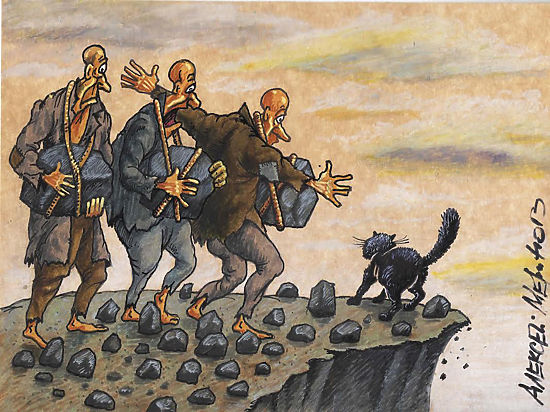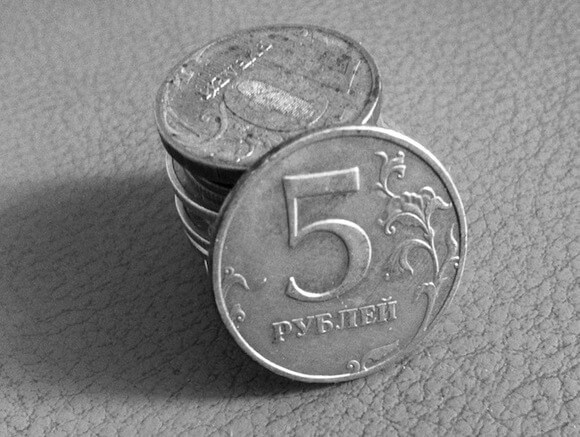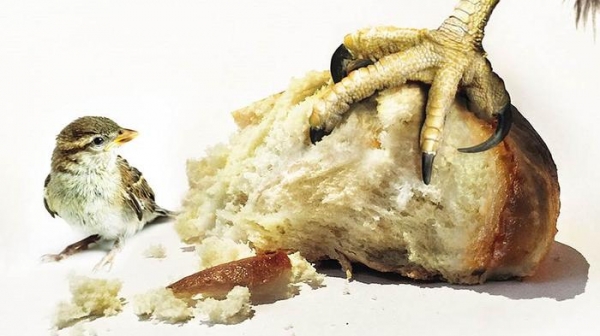
Fifteen Russian citizens included in the list of hundred richest people in the world. These are the findings of the study the Agency “Bloomberg”. The richest among Russians “Bloomberg” considered the owner of the Interros holding company and General Director of “Norilsk Nickel” Vladimir Potanin. His fortune is estimated at 14.7 billion dollars. And faster only increases capital the co-owner of NOVATEK Gennady Timchenko, who today is about 8.6 billion, with two billion it earned this year.
In total, according to “Bloomberg”, 15 Russian billionaires own the total property value is 156.6 billion. For comparison, at the current rate on the entire social sphere this year, the state budgeted 65 billion dollars. Slightly less than is received by the Treasury from the tax on value added.
Of course, the trouble is not Russia that live in it are rich people. The trouble is that the country is constantly increasing the number of poor.
The main problem is the increasing social stratification. In 2013, the poor, i.e. whose income is below the subsistence level (7326 rubles in the 4th quarter of 2013), there were 15.5 million people. In 2014 this figure was 16.1 million (8234 of the ruble at end of year) as of last year, poor was 19.2 million people, or 13.4% of the population. Then the subsistence minimum was $ 9452 ruble.
If you believe the statistics about per capita incomes of Russians, at the end of 2015 on average receive about 34 thousand rubles. But it was the income of oligarchs with incomes of everyone else. However, for the rich, who represent a tiny fraction, accounted for about half of all revenues. This means that the real wages of Russians were twice lower than those shown by official statistics.
— In Russia, an increasing proportion of the poor, — says Director of the Russian centre of living standards Vyacheslav Bobkov.
On the other hand, decreased the number of people with higher. As a result of the crisis some part of those who have high incomes, have left this group of citizens. But there’s a second trend. Those who remained in the environment of the super-rich, increased its average income. That is, the differentiation increases. The income of very wealthy individuals more and more detached from the incomes of those who are below the subsistence level.
“SP”: — what is the reason of growth differentiation?
— We have this process going on for the past twenty years. This is a common trend of Russian oligarchic capitalism. We have a capitalism where money is made by merging of business and government. As practice shows, in times of crisis more the government helps big business than bad wealthy citizens.
“SP”: — In General, our trends differ from those worldwide?
— Now a General trend on the planet is the growth of income inequality. It’s just a property of capitalism. In most countries the difference in income grows. In times of crisis, someone pushed to the sidelines of life, and someone gets richer.
But we should separate the concepts. One thing is inequality of current income. In our Center, we have identified several groups of citizens. There are those who has income below the subsistence minimum. The next group — who have incomes below three minimum. This is also a low income layer. And have to be considered so, because by itself, the living wage does not cover basic needs. To the middle-layer we include people with incomes from three to seven minimum. Inequality in income, we can only evaluate according to official statistics.
But we can’t assess the standard of living of the super rich. In fact, we have not so many billionaires. Their basic share is living in the United States. And the number of the rich and their state.
“SP”: — whether there is No guile in counting the number of poor depending on the number of those who have the income below a living wage? After all, who income a little more to the poor is not considered.
— At the end of last year, the subsistence minimum has decreased a bit due to the fact that prices fell for the potatoes. This was the result of a good agricultural year, affected partly and import substitution.
We have very low living standards. Our Center has developed such a thing as “socially acceptable budget.” We fill the gaps in the consumption patterns of low income. Tried to reproduce the real life of the poorest. If to deprive people of some aspects of consumption, they generally will not fit into modern life. For example, this is eating out, which increases the cost of the consumer basket. If we talk about non-food part, we can think about modern means of communication, such as mobile phone, computer, Internet. It’s not provided the current cost of living. For example, the child, if the family has no computer, can not fit into life. This also applies to the older generation, whose members pay via the Internet receipt.
We should not forget about legal service, which can not do without in a market economy. We have partially paid education, even in school you have to pay for the mugs. All this is not officially adopted the consumer basket.
Now, if such, a more objective picture of consumption to portray, a living wage would be about three times more official.
We are now in Russia about 13% have an income below the official subsistence level, approximately 40% — from one to three minima, that is below the socially acceptable budget. In excess of half of the citizens have low incomes.
“SP”: — is There a possibility to change the situation?
— Easy recipes there is, the process of poverty reduction is always difficult. But the road to change is clear.
First of all, we have very few employees get. Over 90% of the population do not live at the expense of the business, and through the sale of their labor. That means we need to raise the minimum wage. The law States that it must be not less than minimum wage working. In practice, it is about 60% of the minimum. Now the President has signed the law on raising the minimum wage from 1 July to 7500 rubles, but the cost of living of the working population of about 11 thousand. The minimum wage is known to repel all wages.
If we raise wages for working people will decrease poverty. Then we will have the opportunity to help those who do not have labor income. We want to improve the demographic situation, that means we need to increase benefits for children. But the amount of the benefit is difficult to improve, because workers receive little.
Where to take means? It is necessary to introduce a progressive scale of taxation. Moreover, we must not consider the income of the individual, and the income of the household. Salary man still says nothing, nobody knows what goes to the family. When you add up all the income of family members and divided by the number of people then it is already possible to draw a conclusion about how the lives of the household.
If per capita income is below the subsistence level, then it’s not necessary to take any taxes. If three lows — taxes should be small or absent. With well-to-do we need to take more. Then the regions will be the means to increase social benefits. In the end, we really will change the lives of people.
Of course, the rich have to pay more property tax. The occupancy of the budget should be such to bring people out of poverty.
His version of progressive taxation from the Professor of the Academy of labour and social relations Andrei Gudkov.
— We have the main tax burden imposed on workers for hire. Employees pay 13% employer and 30% in social benefits. But if the person receives income from property, then he only pays 13%. Let’s face it, is not very fair.
This difference in income is not in Europe and even in the United States. Everywhere is a progressive scale of taxation. We have a tax for all one. Apparently, because otherwise the Ministry of Finance will have to work harder. A progressive tax to collect much more complicated in terms of administrative procedures. In the end we have blatant social stratification.








